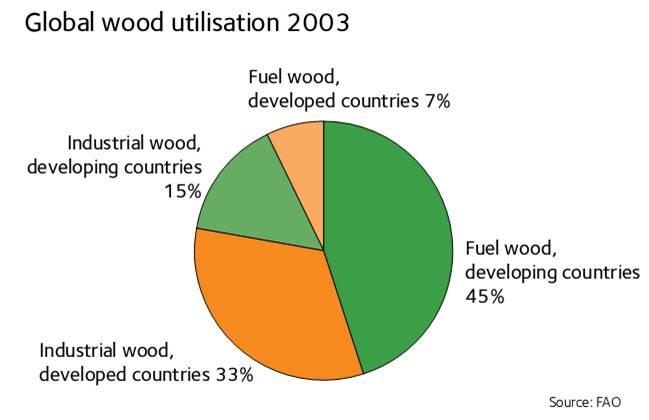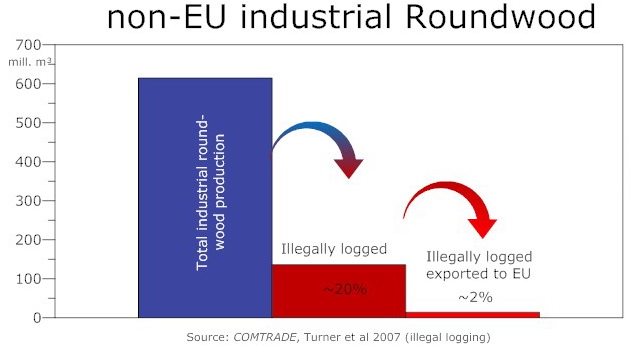December 2012 - a note by the editor of ForestIndustries.EU:
TWO years after we have published the article below, the British NGO, Environmental Investigation Agency (EIA), published a detailed report at the end of November called "China, appetite for destruction" (PDF). Main conclusion: "After analysing trade data for 36 supplier countries, the EIA has concluded that approximately 10% of the logs and sawed timber is illegal".
We have estimated the volume of timber being sourced from illegal sources at the extend of 20% - globally - according to the EIA it's half...
Read further here as well: The real drivers of deforestation - (December 2012)
January 2017: a note by the editor of ForestIndustries.EU:
- Furthermore there is now prove of the statements we did seven (sic!) years ago: Ending Tropical Deforestation: Have We Got Our Priorities Backwards?
-
IUFRO came to the same conclusions: Illegal Logging and Related Timber Trade - Dimensions, Drivers, Impacts and Responses (PDF-Report, PDF-Policy-Brief)
One of the main findings of the IUFRO researches: "The majority of timber resulting from illegal forest activities is traded domestically"...
May 24, 2010: Between 20-40% of the world wood production comes from illegally logged tropical forests. In April 2009 the European Parliament voted to ban trade in illegally logged timber following the example of the US. Now the text is back at Parliament and Environment Committee MEPs are not satisfied with what the EU governments in the Council have made of it - EU Council rejects ban on illegal timber imports. On 4 May 2010 the Environment Committee of the European Parliament voted again.
The Council position officially adopted in March was considerably weaker than the 1st reading position of the EU Parliament. It did not contain a prohibition on trading illegally harvested timber and timber products, and it did not specify penalties, or require criminal sanctions for serious infringements; the regime for the recognition of monitoring organisations was also different to what Parliament had asked for. On 4 May 2010 the Environment Committee adopted a draft recommendation for a second reading, reinstating most of Parliament first reading amendments which the Council had not taken on board. The EU Parliament and Council have now started negotiations on a possible compromise between the positions of the two legislators before the Parliament plenary vote scheduled for July.
So far the press release of the European Forest Institute.
There is lot of things to say about this, but important things first:
- Nowadays it is common sense to mix terms like illegal timber trade, illegal logging and deforestation - which is wrong
- The statement "Between 20-40% of the world wood production comes from illegally logged tropical forests" is just another empty phrase
So, what is:
- Illegal timber trade: This is trading of timber which is cut without authorization by the proprietor.
- Illegal logging: This is cutting of timber without authorization by the proprietor intentionally because of making further profit by selling of the wood.
- Deforestation: This is clearing of forested land intentionally because of further land uses other than forests
This is why those terms can not be mixed up.
What is world wood production?
|
You can assume that 98% of all rainforests are placed in developing countries Just to remind you: The European Parliament is stating: Between 20-40% of the world wood production comes from illegally logged tropical forests As you can see: 60% of the "world wood production" is done in developing countries, but 75% out of this is fuel wood - fuel wood which is mainly used for cooking (which might be logged illegally but contributes substantially to the livelihood of the poorest). But let us go further: |
 |
|
When starting to think about banning of illegally logged timber from EU markets: ~2% of all non-EU logged commercial roundwood could be illegally logged timber which might approach the EU market Source: Assessment of Impact of Import and Sales Ban (additional |
 |
When starting to read here (this is the official website the European Parliament) you will find astonishing info (re-checked in early 2014: the text has been deleted by European Parliament, but we have filed a copy of the original text here):
Named "What's the problem?" you can read following sentence:
"Illegal logging is a major driver of deforestation, with the volume of industrial wood from illegal sources estimated at 350 to 650 million m3 per year, representing 20%-40% of global industrial wood production."
The truth is:
Illegal logging is NOT the main source of deforestation ► read here... or here as well
Even logging of timber is NOT the main source of deforstation or of CO2 emissions from deforestation ► read here...20% of industrial roundwood production might come from illegal sources (there is no evidence of any higher figure), but only 2% of illegally logged industrial roundwoud is approaching EU borders..
► Do you want to know why the EU is risking its credibility?
► There is an INTERPOL project called "CHAINSAW"
Read the report and see how even an authority is juggling termns...
Read further here: The real drivers of deforestation - (December 2012)
Trade flows, illegality hot-spots and data monitoring
---------------
Environment MEPs get tough on illegal timber trade

